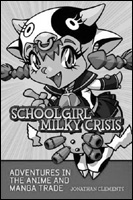Schoolgirl Milky Crisis: Adventures in the Anime and Manga Trade
by Jasper Sharp
Call me a cynical old curmudgeon, but the world of anime and manga scholarship is a regular source of bemusement to me. For starters, it's obvious that the single-minded focus on the purely Japanese product suggests that many of its main authorities see something irreconcilably different in these media than in animation and graphic novels produced outside of Japan, and that these qualities therefore elucidate unique hidden truths about Japanese culture, society, traditions and aesthetics. Comparisons or connections between the art and economics of similar industries across the world, when they do occur, are usually reduced to a simplistic Japan-versus-Hollywood binary.
Why, oh why then, as I've noticed over the years, is it that the field's most fervent writers and researchers seem to have so little interest in other aspects of Japanese culture, notably live-action cinema or literature. The focus is so tightly restricted to the object of analysis that, more often than not, one comes away with the feeling that the relentless theorising around topics such as magic girls, cyborgs and cosplay is merely just an excuse to valorize the otaku by replacing fanboy jargon with academic gobbledygook, taking the discussion into realms where it probably doesn't belong. While I've argued strongly myself that cartoons aren't just for kids and there is plenty of interest to be found in the field (if you look in the right places), sometimes you just feel like banging these peoples' heads together and shouting "For God's sake, it's only a cartoon!"
And so, despite the success of Miyazaki et al, anime appreciation remains in something of a ghetto, wrapped in layers of impervious verbiage guaranteed to put off the casual viewer. In light of these observations, Jonathan Clements is something of a violin in the void. Best known for his sterling work on The Anime Encyclopedia, his latest foray into the subject, which takes its rather bizarre name from an imaginary unmade series that he regularly invokes in his insider anecdotes to protect the innocent, is a compendium of almost twenty years of assorted articles, lectures and liner notes largely gleaned from his regular columns for the magazines Neo, Newtype USA and the UK SCI FI Channel website.
I'm going to quote from one of these pieces, called "Explanations: The Search for Deeper Meanings", because I think it encapsulates the reservations I expressed above, as well as giving an example of the irreverent wit that marks a lot of these articles:
'Have you ever wondered how a Japanese pundit might sound holding forth on our own culture with the same kind of attitude?
"Aha! The comic. Yes, the komm-ick. Contracted from the German for 'come with me', the traditional invitation of the medieval story teller. A comic, or in some parts of Europe, a comique, is by definition, comical. You see, they have to be funny. If it's not funny, it's not a comic. The first comic was invented in a cave in France by a nameless Stone Age man. It was about a reindeer hunt, but the guy in the cave next door drew his own about a bear hunt, and eventually there was a crossover. DC have recently released it as Reindeer Hunt Reloaded, with two collectible covers. Then came the Bayeux Tapestry, which wasn't actually a comic, but looks a bit like one. In Europe, comics are usually read by children, as they have more time on their hands. Adults don't read at all, unless it's Harry Potter, or fan fiction they downloaded for free off the Intarwebnet. Comics often have square panels in order to create cruciform shapes in the spaces in between, a reference to the European cult of Christianity..."'
Clements is particularly well placed to talk about such things, not only because he's been working at the coalface of the industry for years, as a translator, scriptwriter, voice cast director (and sometimes voice actor) and all-round pundit, but because he's not unhealthily fixated on just this one subject, as a glance at some of his recent book titles bears out: A Brief History of the Vikings, The First Emperor of China, Wu: The Chinese Empress Who Schemed, Seduced and Murdered Her Way to Become a Living God, and Confucius: A Biography.
At almost 400 pages in length, Schoolgirl Milky Crisis touches on all sorts of areas of interest, and not only in the field of anime and manga. There are interviews with the likes of Mamoru Oshii, Neil Gaiman and Barefoot Gen creator Keiji Nakazawa. There's information on Chinese animation, hentai anime, manga adaptations of Mills and Boon romances, recent Korean cinema, kaiju eiga and the eikaiwa racket (the piece 'Gaijins and Dolls: Language School or Dating Agency?' is sure to invoke shudders of recognition amongst all us poor sods who have served our time teaching English in Japan). Perhaps the most interesting parts for anime fans are going to be the pithy anecdotes surrounding the clueless moneymen that jumped on the bandwagon after the field started being seen as something of a cash cow in overseas markets.
There's lots of information here, and Clements casts his net far and wide, although not necessarily particularly deep, which is fair enough given its piecemeal format. With most of the pieces about a page in length, it makes for a breezy read, and without wishing to be too facetious (and certainly in no way a reflection on the quality of the writing), Schoolgirl Milky Crisis fits pretty comfortably into the "toilet book" category: a book you'll more likely want to keep dipping in and out of rather than scouring from cover to cover in a single sitting. But it's fun, and certainly casual consumers of Asian culture will find much of interest, while I dare say academics could also learn a thing or two.
